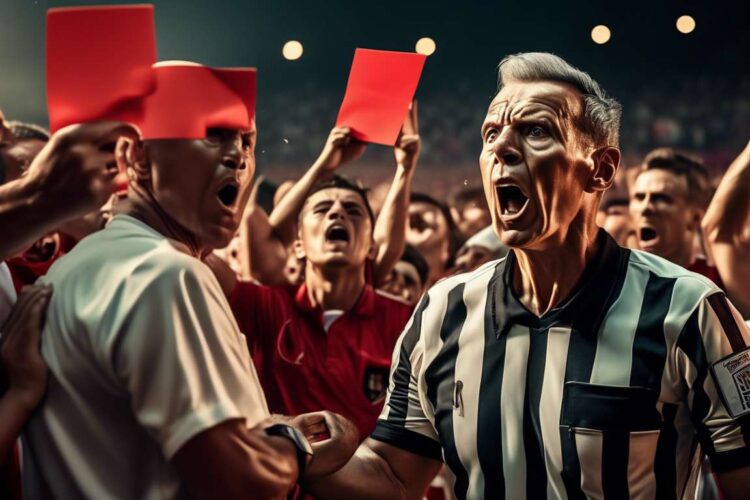In the world of sports, the thrill of victory and the agony of defeat are experiences we, as avid fans and passionate supporters, all share. Yet, amid these highs and lows, there exists a common thread that unites us: the controversy surrounding referee decisions.
Referee decisions often become pivotal moments that linger in our collective memory. Whether we are gathered in stadiums, huddled around screens, or engaged in heated discussions with friends, these calls can:
- Spark intense debates
- Fuel rivalries
- Sometimes even overshadow the game itself
Today, we delve into seven of the most controversial referee moments that have left an indelible mark on the sporting landscape. Together, we will:
- Explore the intricacies and outcomes of these calls.
- Reflect on how they have shaped not only the matches but also our perspectives as fans and enthusiasts.
Let us journey through these contentious moments and consider their lasting impact.
The Hand of God (Argentina vs. England)
The infamous "Hand of God" goal by Diego Maradona during the 1986 World Cup match between Argentina and England remains one of the most controversial moments in football history. As fans, we remember the shock and disbelief that rippled through the stadium and living rooms worldwide. Maradona’s cunning touch with his hand went unnoticed by the referee, sparking heated debates about referee decisions and fairness in the game.
This moment still unites us in passionate discussions about what could’ve been if the referee had spotted the infringement.
Back then, we didn’t have the technology like VAR to assist referees in making accurate calls. The absence of such tools made referee decisions more prone to human error, leading to controversies that linger in football folklore.
Today, as we gather to watch matches, we appreciate how VAR has transformed the game, reducing such incidents. Yet, the "Hand of God" remains a testament to football’s unpredictable and captivating nature.
The ‘Phantom Goal’ (Chelsea vs. Tottenham)
In one of the most debated Premier League moments, Chelsea’s "Phantom Goal" against Tottenham in 2012 left everyone questioning the legitimacy of the decision. The referee’s decision to award Chelsea a goal, despite the ball not clearly crossing the line, sparked immediate controversy and heated discussions.
As fans, we thrive on the shared experience of football’s highs and lows, but this moment left us united in confusion and disbelief.
We remember the tension as Tottenham players protested. The impact of the referee’s decision resonated through the stadium and beyond. It was one of those moments that made us all long for clarity and fairness in the game.
With the advent of VAR, we can’t help but wonder how differently things might have played out.
We crave assurance that the beautiful game remains just that—beautiful and fair. Together, we continue to hope for decisions that respect the spirit of camaraderie we cherish.
The ‘Handball’ (France vs. Ireland)
In one of football’s most infamous moments, we all watched in disbelief as Thierry Henry’s handball helped France defeat Ireland in the 2010 World Cup qualifying playoff. As fans, we thrive on the shared exhilaration of fair play, but referee decisions can sometimes shatter our collective trust.
This particular incident left us questioning the integrity of the game we love. Henry’s handball wasn’t spotted by the officials, and it led directly to a goal that secured France’s passage to the World Cup, leaving Ireland heartbroken and fans worldwide embroiled in controversy.
Had VAR been available, we believe this incident might have played out differently. Video Assistant Referee technology, which has since been implemented, provides referees with tools to make more accurate decisions, reducing the chance of such pivotal mistakes.
While VAR isn’t perfect, it offers a sense of justice and belonging to fans who crave fairness. The handball incident remains a reminder of why we strive for better officiating in our beloved sport.
The Disallowed Goal (England vs. Germany)
In one of the most debated moments in World Cup history, we witnessed England’s clear goal against Germany disallowed during the 2010 tournament. Frank Lampard’s shot hit the crossbar and bounced well over the goal line, yet the referees failed to award the goal. We all felt the collective frustration and disbelief, knowing that a crucial opportunity for England was lost.
This incident sparked a massive outcry, as fans and players alike questioned the referee decisions that could change the course of a game.
The controversy surrounding this decision highlighted the need for technological assistance in football. It wasn’t just about a single match; it was about fairness and justice for teams and fans everywhere. This moment was pivotal in the eventual introduction of VAR (Video Assistant Referee), which aims to prevent similar injustices.
As a community passionate about football, we understand how important it is for the game to evolve and ensure fair play for everyone involved.
The Offside Controversy (Real Madrid vs. Bayern Munich)
During a high-stakes Champions League match between Real Madrid and Bayern Munich, we witnessed a pivotal offside decision that left fans and analysts debating its impact on the game’s outcome. The referee decisions during this match sparked controversy throughout our community of supporters, as we all yearned for fairness and clarity in the beautiful game.
A crucial goal was disallowed due to an offside call, leading to heated discussions about the accuracy and consistency of officiating.
As we watched, VAR was called upon to review the play. We hoped technology would provide the transparency needed to quell any doubts. Yet, the final decision left many of us questioning whether VAR truly upheld the spirit of the game or simply added another layer of complexity.
This moment reminded us of the times when our collective passion for football intertwines with a longing for justice, urging us to come together and advocate for:
- Clearer referee decisions
- More consistent officiating
In the end, this match served as a reminder of our shared desire for a game that reflects both our enthusiasm and our pursuit of fairness.
The Penalty Drama (Spain vs. Italy)
In the thrilling clash between Spain and Italy, a controversial penalty call became the focal point, igniting debates over its legitimacy and impact on the match’s outcome. As fans, we found ourselves divided over the referee’s decision, which seemed to hinge on a mere moment of contact in the box. The tension in the stadium was palpable, as supporters from both sides held their breath, wondering if VAR would intervene to overturn what many considered a dubious call.
Despite the technology in place to ensure fairness, the penalty stood, leaving us questioning the consistency of VAR and the human element in referee decisions. This moment highlighted that even with advanced technology, controversy remains an inseparable part of the beautiful game.
We couldn’t help but feel a sense of unity in our shared frustration, as discussions and debates continued long after the final whistle. Moments like these remind us of the passion and connection that football creates among us all.
The VAR Intervention (Brazil vs. Costa Rica)
In the heated match between Brazil and Costa Rica, we witnessed a pivotal moment when the referee consulted VAR to review a critical offside decision.
As fans, we all know how much rides on these calls, especially when they can change the course of a game. The anticipation was palpable as the referee paused play, leaving us all on edge, eager to see justice prevail. This particular decision stirred intense controversy, sparking debates among fans and analysts alike about the role of VAR in modern football.
Referee decisions have always been a hot topic, but with the introduction of VAR, the stakes feel even higher. We find ourselves torn between:
- Trusting the technology
- Longing for the days of human error and unpredictability
In this match, the referee’s decision to overturn the initial call led to heated discussions, uniting us in our shared passion for the game.
Together, we experienced the highs and lows of football’s evolving landscape.
The Red Card Chaos (Portugal vs. Netherlands)
We all held our breath as the referee brandished a red card during the fiery clash between Portugal and the Netherlands, sparking immediate uproar on and off the field. It was one of those moments when we, as fans, felt the deep divide between our teams and the officials. Referee decisions are always scrutinized, but this one added fuel to an already blazing rivalry.
The controversy wasn’t just about the red card itself but also about the absence of VAR to review such a crucial decision.
In arenas packed with passionate supporters, we crave fairness and transparency. VAR, when used, can bridge that gap, offering clarity in chaotic moments. However, its absence during this match left us questioning the integrity of the decision.
We, as a community, want to trust the process, to feel that our shared love for the game is respected. Moments like these remind us that every call can echo through our shared experiences, uniting or dividing us.
How do referees prepare for high-stakes matches to minimize controversial decisions?
We always aim to minimize controversial decisions in high-stakes matches by preparing meticulously.
Referees undergo thorough training, which includes:
- Studying game rules
- Analyzing various scenarios
We focus on staying sharp both mentally and physically to make split-second calls accurately.
Communication among the officiating team is key to ensure:
- Consistency
- Fairness
Our goal is to uphold the integrity of the game and provide a level playing field for all teams involved.
What technological advancements are being developed to assist referees in making accurate calls?
We’re seeing exciting advancements in technology to aid referees in making precise calls. VAR, goal-line technology, and AI-assisted systems are at the forefront.
These tools provide real-time insights to help officials make accurate decisions. With these innovations, the game is becoming fairer and more transparent.
We’re eager to witness how these technological advancements continue to shape the future of refereeing in sports.
How does FIFA address controversial referee decisions after major tournaments?
After major tournaments, FIFA usually conducts thorough reviews of controversial referee decisions.
They focus on several key actions:
- Analyze the incidents
- Gather feedback from teams and officials
- Aim to improve the overall officiating process
By addressing these contentious issues head-on, FIFA demonstrates its commitment to fair play and continuous improvement. This approach helps maintain the integrity of the game and fosters trust among:
- Fans
- Players
- Stakeholders
Conclusion
In conclusion, referee decisions in football have always been a hot topic of debate.
From controversial handballs to disallowed goals, these moments can change the course of a game in an instant.
Fans will always have strong opinions on these incidents, but one thing is for sure:
- They add an element of unpredictability.
- They contribute to the drama of the sport.
These factors keep football exciting for everyone involved.

